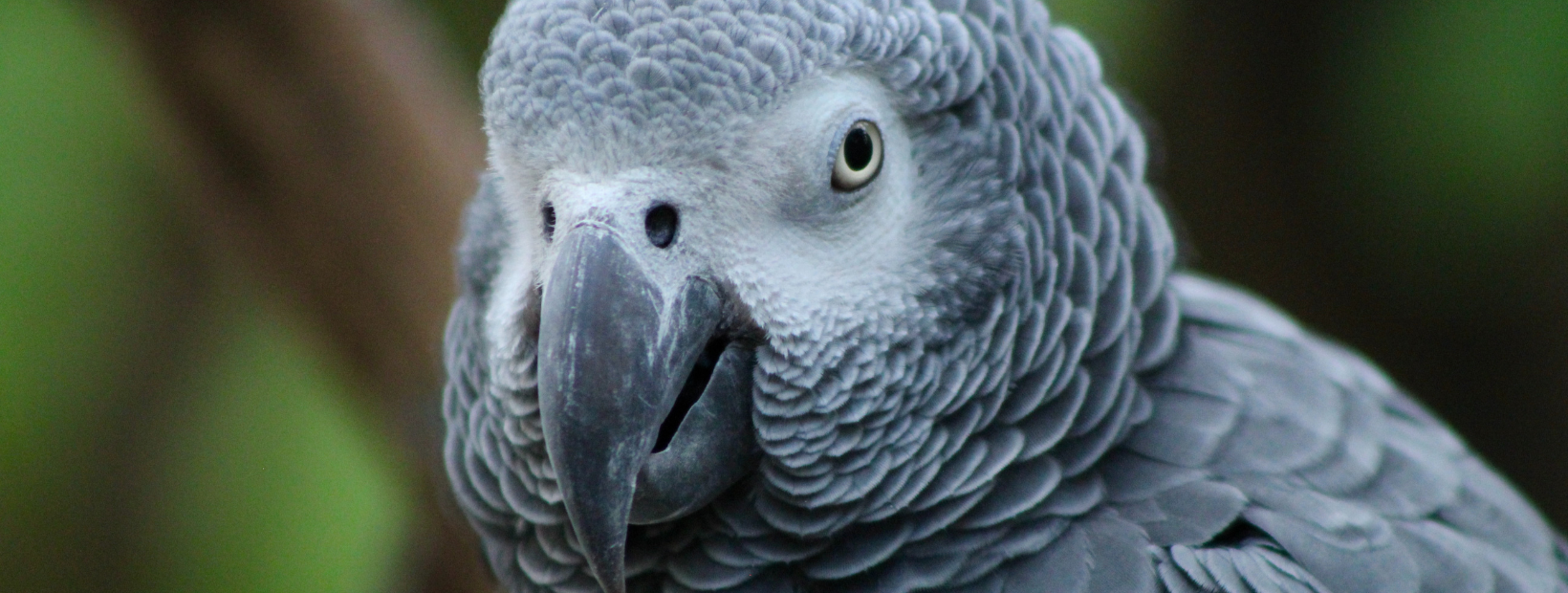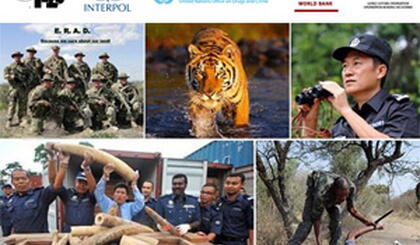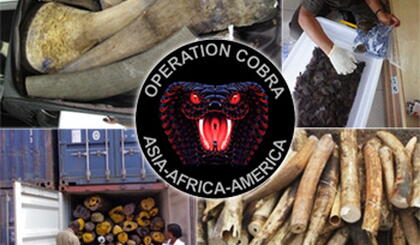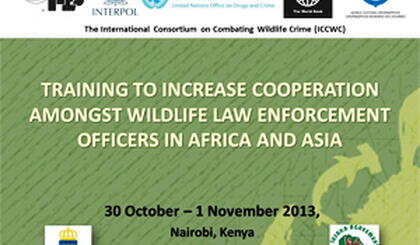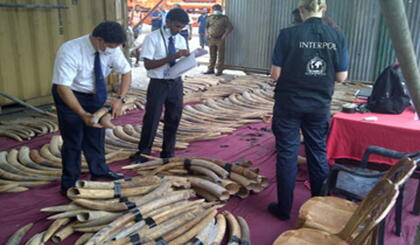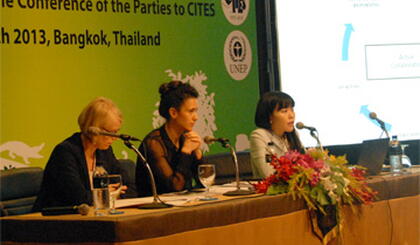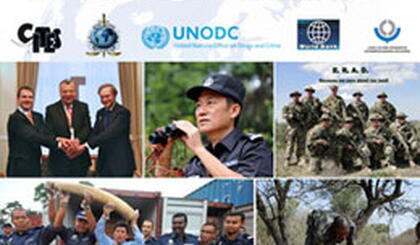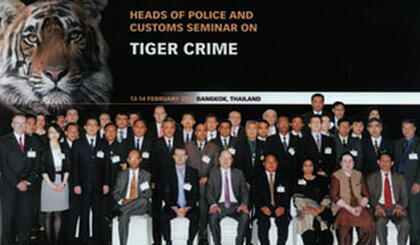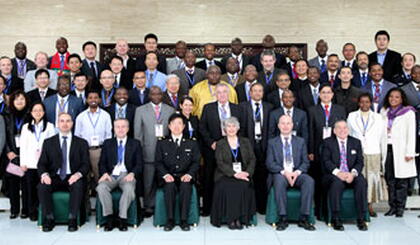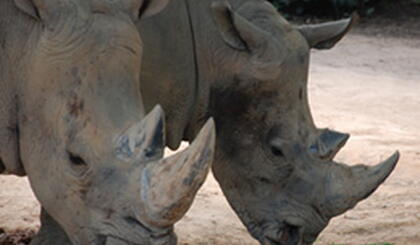L’ICCWC lance un nouveau portail Web sur la lutte contre la criminalité liée aux espèces sauvages et aux forêts
Le Consortium international de lutte contre la criminalité liée aux espèces sauvages (ICCWC) a annoncé aujourd’hui le lancement d’un nouveau portail Web, conçu pour soutenir les efforts de renforcement des capacités en améliorant l’accès à l’information sur les outils et activités de l’ICCWC relatifs à la lutte contre la criminalité liée aux espèces sauvages et aux forêts. Le portail dédié à l’ICCWC, disponible via le site Web de la CITES ( www.cites.org ), fournit des informations actualisées et détaillées sur
Le Secrétariat de la CITES se félicite des résultats de l’Opération Cobra II
Genève, le 10 février 2014 - Le Secrétaire général de la CITES, M. John E. Scanlon, a salué aujourd’hui les excellents résultats obtenus par les agents de lutte contre la fraude de 28 pays au cours de l’Opération COBRA II, une opération mondiale de lutte contre le commerce illégal des espèces sauvages, qui a duré un mois et a pris fin le 27 janvier 2014. « Cette deuxième initiative de l’Opération COBRA montre ce qui peut être accompli lorsque les
L’ICCWC dispense une formation spécialisée pour les agents chargés de l’application des lois sur les espèces sauvages. Une collaboration accrue entre les pays d’Afrique et d’Asie est encouragée.
Le Consortium international de lutte contre la criminalité liée aux espèces sauvages (ICCWC) a organisé, à Nairobi, Kenya, les 30 et 31 octobre 2013, un atelier de formation de pointe d’une durée de deux jours qui s’adressait aux agents chargés de l’application des lois sur les espèces sauvages de 21 pays. La formation a renforcé les compétences des agents chargés de l’application des lois en Afrique et en Asie en matière de lutte contre la criminalité transnationale organisée liée aux
ICCWC deploys a Wildlife Incident Support Team (WIST) to Sri Lanka
In response to the need to take new approaches to combat the illegal trade more effectively, the International Consortium on Combatting Wildlife Crime (ICCWC), at the request of Sri Lanka, deployed its first Wildlife Incident Support Teams (WIST). The WIST was aimed at collecting DNA samples from 359 elephant tusks that were seized by Sri Lanka Customs authorities in the port of Colombo and was in response to a Decision adopted by the Conference of the Parties to CITES at
L’ICCWC publie le rapport de la première réunion mondiale des réseaux de lutte contre la fraude liée aux espèces sauvages et met au point une stratégie pour obtenir un appui permanent.
Le Consortium international de lutte contre la criminalité liée aux espèces sauvages (ICCWC) a réuni pour la première fois les réseaux de lutte contre la fraude liée aux espèces sauvages du monde entier en marge de la Conférence des Parties à la Convention sur le commerce international des espèces de faune et de flore sauvages menacées d’extinction (CITES), qui s’est tenue en mars 2013 à Bangkok (Thaïlande). La première réunion mondiale des réseaux de lutte contre la fraude en matière
ICCWC delivers specialized training for law enforcement officers
Cutting-edge training in investigation techniques has been delivered to wildlife law enforcement officials across Asia, helping them in their battle to halt transnational organized wildlife and forest crime. Over the past few years, there have been a number of successful seizures and arrests of wildlife traffickers at airports, seaports and border crossings in Asia, Africa and other regions of the world. These typically result from risk analysis or actionable intelligence of an individual traveling with illegal wildlife such as ivory
Wildlife crime consortium to host high-level events on transnational organized wildlife crime at CITES Conference
Wildlife and forest crime is increasingly organised and is demanding a more determined and coordinated enforcement response. The International Consortium on Combating Wildlife Crime (ICCWC) will host two major events at the Queen Sirikit National Convention Center (QSNCC) at the 16th meeting of the Conference of the Parties to CITES to be held from 3 to 14 March in Bangkok, Thailand. ICCWC will convene a roundtable on combating transnational organized wildlife and forest crime for Ministers and high-level representatives, to
Opening remarks by John E. Scanlon, CITES Secretary-General
Bangkok, Thailand, 14 February, 2012 Executive Director of INTERPOL's Police Service Leaders of the Customs and Police authorities of the tiger range States Representatives of the Host Country Colleagues from the International Consortium on Combating Wildlife Crime Distinguished participants " Our collective enforcement efforts to fight tiger crime must not just result in seizures - they must result in prosecutions, convictions and strong penalties to stop the flow of contraband. If we get the entire enforcement system right for the
Controlled deliveries: a tool for reaching the big players in illegal wildlife trafficking
A group photo of the participants to the workshop (click to enlarge) Organized by the World Customs Organization (WCO), under the auspices of the International Consortium on Combating Wildlife Crime (ICCWC), the first international workshop on Establishing a Network of Controlled Delivery Units for Forest and Wildlife Law Enforcement ended on 9 December, after three days of deliberation. Controlled deliveries have long been a tool for investigating drug and tobacco smuggling but their use in wildlife smuggling is more recent
CITES Secretary-General welcomes Resolution of the United Nations Commission on Crime Prevention and Criminal Justice on illicit trafficking in endangered species of wild fauna and flora
During its meeting in Vienna, from 11-15 April 2011, the United Nations’ Commission on Crime Prevention and Criminal Justice adopted a Resolution on “Crime prevention and criminal justice responses against illicit trafficking in endangered species of wild fauna and flora” which was proposed by Chile, Costa Rica, Guatemala, Mexico and the Philippines. Organized criminal networks are known to be involved in the poaching of rhinoceroses, as one example of illicit trafficking in endangered species. The Resolution ( full text attached)
Pagination
Filtrer par
Clear filters